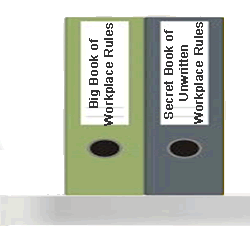- POPULAR ARTICLES
- Thank You Words
- Retirement Wishes
- Face to Face
Breaking Workplace Rules
Breaking workplace rules - purposefully or unknowingly -may lead to conflict in the workplace.
Why?

People at work may be annoyed by written and unwritten rules, but comply with them out of necessity to keep their jobs.
When they see someone breaking the workplace rules and getting away with it, resentment starts to build.
Left unchecked, resentment leads to mistrust on the person breaking the rules, the manager that allows it to happen, and the organization where rule breaking is allowed. Let's review a couple of examples.Breaking Written Rules
Dave comes to work late 20 minutes late every day. He makes up for his tardiness by shortening his lunch. Others that are punctual think that Dave needs to be counseled and disciplined for his tardiness.
If management allows Dave to continue breaking workplace rules, others will resent Dave and his manager.
Breaking Unwritten Rules
When Steve started socializing with his boss's boss, that was ok by Steve's book. However, Steve's direct boss, Diana, didn't like at all.
In Diana's view, Steve was breaking the unwritten rule of sticking to the chain of command, even in social situations. No one will tell Steve he can't socialize with Diana's boss. After all, people outside work are free to chose who they communicate with. There is no "social" chain of command that one must stick to.
But Steve's behavior will start to create resentment and potential work conflict down the road. Diana will not be the only one resenting Steve's actions. Steve's co-workers will think: how come he can do it and I can't?.
Of course those that resent Steve could also break the same unwritten rules, but they don't dare for whatever reason.
Something that appears trivial may degenerate into full blown conflict.
The Road to Conflict in the Workplace
People tend to resent those that break the norm. Their resentment can grow to become harmful to work relationships.
The more a person adheres to a code of conduct at work, the more he/she will resent rule breakers.
Rule breaker's come to represent the compliant person's shadow self. What this means is that the norm breakers represent a hidden and dark part of the norm complying types, a shadow they would rather not see, much less accept they have. For an in-depth review of the shadow self concept, I recommend the book by Connie Zweig and Jeremiah Abrams: Meeting the Shadow (A New Consciousness Reader).
If you are the norm breaker, recognize that you may be causing resentment at work and either be prepared to deal with its consequences or just clean up you act and play by the norms, written and unwritten.
If you are the one resenting the norm breaker, consider that your rebel side may be hiding in your shadow, invisible to you. Acknowledging and owning your shadow frees you up to be more accepting of yourself and others. You don't have to behave like a rebel, you just have to know you could behave like one.
If you are the manager supervising a rule breaker, just address the problem: Enforce the workplace formal rules, you have all the personnel tools at your disposal to deal with the offender and restore the peace. The next time someone breaks the unwritten rules of the workplace, coach the person breaking the norm so they are fully aware of the possible consequences of their actions.




